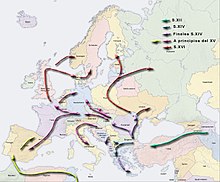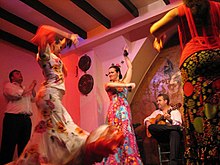Caló (language)
| Caló | ||
|---|---|---|
|
Spoken in |
Spain (especially Andalusia ), France , Portugal , Brazil | |
| speaker | 70,000 | |
| Language codes | ||
| ISO 639 -1 |
- |
|
| ISO 639 -2 |
roa |
|
| ISO 639-3 |
rmq |
|
The language of the Gitanos on the Iberian Peninsula is called Caló . It is mainly spoken of Gitanos in the south of Spain, in the regions of Andalusia and Extremadura , who refer to themselves as Calé (also spelled Kalé). The language of the Kalé, called Caló by them and also called Ibero-Romani in linguistics, is no longer a Romani language in the actual sense, but is referred to as the Para-Romani language , because it is not only in sound and vocabulary, but also its syntax and morphology is so strongly influenced by its Romance contact languages that it is considered a variant of it and no longer a variant of Romani.
Linguistic classification
The Caló is called a mixed language. Linguists have found around 300 to 400 words in the Caló that come from Romani, although the vocabulary of the individual interviewed persons only contained a maximum of 100 of these Romani words. The Romanes part of the language comes from the language of the Kalderash , who traditionally lived as coppersmiths and tinkers. Most of the rest of the Caló comes from the Romance languages of the Iberian Peninsula, where the Kalé have lived since the 15th century. For this reason, a Caló speaker cannot converse in Romany with Roma from Eastern Europe, as the Caló has moved too far from the Romani . The main Romanesque influence on the Caló comes from Castilian , especially from its southern Andalusian variants . In the various regions of the Iberian Peninsulas, however, there are different varieties of Caló, which are shaped by the respective local Romance languages. There is a Catalan caló, a Portuguese caló ( called Calão there, or Lusitano-Romani ), as well as a Brazilian caló ( Calão Brasileiro ) in the New World . The Basque Country has its own Roma language, Erromintxela , also known as Caló Vasco in Spanish . Erromintxela, however, is a mixed language between Romany and Basque and has only a small proportion of Romance influences.
The Andalusian Caló often contains numerous ancient forms of Castilian, such as the Voseo (polite salutation with vos instead of Usted ). Phonologically, as in many other southern Spanish varieties, the distinction between s [s] and z [θ], the so-called Seseo and Ceceo , which is otherwise so typical for Iberian Spanish, coincides .
Number of speakers
The Caló is an endangered language whose number of speakers is declining from generation to generation, as many young Gitanos switch to the language of the majority population and only know individual words from the Caló. Currently, the number of Caló speakers is estimated at around 70,000, with 40,000 living in Spain and split between the Castilian and Catalan Caló subgroups. There are around 15,000 speakers in France who speak Castilian or Catalan Caló, including the Erromintxela speakers there. In Portugal, the Portuguese Calão is spoken by around 5,000 people and in Brazil by around 10,000.
Loan words from the Caló
The Spanish and Catalan languages have taken over numerous words from the Caló, some of which have become part of the standard language, some of which are only used colloquially in jargon or slang. Examples are gachó (from Gadscho: "the man"), chaval (from Tschawale, vocative from Tschawo, "boy, boy", originally "son"), parné ("money"), chorar ("steal"), currelar or currar ("work"), fetén ("excellent, super"), molar ("fallen"), pinrel (from pinré, "foot"), biruji ("cold"), piltra ("bed"), churumbel (" Child, baby "), sacais (" eyes "), pitingo (" arrogant "), camelar (" like "), chola (" head "), lache (" revenge "), galochi (" heart ").
In Catalan, the following Caló words can be found in colloquial language: halar (pronounced [həˈɫa] or [xəˈɫa]; "to eat"), xaval ("boy, lad"), dinyar (-la) ("to die"), palmar (-la) ("die"), cangueli ("fear"), paio ("non-Roma"), calé ("money"), cangrí ("prison"), pispar ("nod"), birlar (" nod "), xorar (" steal "), mangar (" steal "), molar (" like "), pringar (" exaggerate "), pirar (-se) (" go away, make yourself scarce "), sobar (" sleep "), privar (" drink "), xusma (" prolo "), laxe (" shame "), catipén (" stink "), xaxi (" great, great "), xivar-se (" betray someone, tease "), xivato (" denouncer "), xinar (-se) (" get excited "), fer el llonguis (" play stupid ") and potra (" luck ").
Caló in flamenco
With its vocabulary and idioms, the caló is one of the most important sources for the texts of flamenco songs. This style of music, which originated in southern Spain, has its origins in the Iberian Gitanos and is the best-known form of expression of their culture worldwide. Since flamenco is not only seen as gitano music, but is considered part of traditional southern Spanish folk music of all ethnic groups, its own flamenco vocabulary has developed. There are words and idioms that do not appear in standard Castilian, but which are part of many Flamenco texts and which mostly come from Caló, but also partly from Moorish Arabic and Jewish Spanish (Ladino). Certain words that have a derogatory meaning in everyday language can have a poetic and particularly emotionally charged meaning in the language of flamenco. The Caló word camelar in Flamenco stands for love, desire, devour and the word mangar stands for demand, demand, plead.
See also
Web links
- Detailed information about the Caló language (Spanish)
- Page of caló in léxico marginal español (spanish)
- Origin of Caló (Spanish)
Language examples
- YouTube : Flamenco en Badajoz , excerpt from the film Latcho Drom by Tony Gatlif , with Flamenco sung in Caló by the Amaya family from Badajoz
- YouTube : El pájaro negro , excerpt No. 2 from Latcho Drom, with flamenco sung in caló by the singer La Caíta
Individual evidence
- ↑ a b c Information about Caló on Ethnologue.com
- ↑ Adiego, I. Un vocabulario español-gitano del Marqués de Sentmenat (1697-1762) Ediciones Universitat de Barcelona (2002) ISBN 84-8338-333-0

